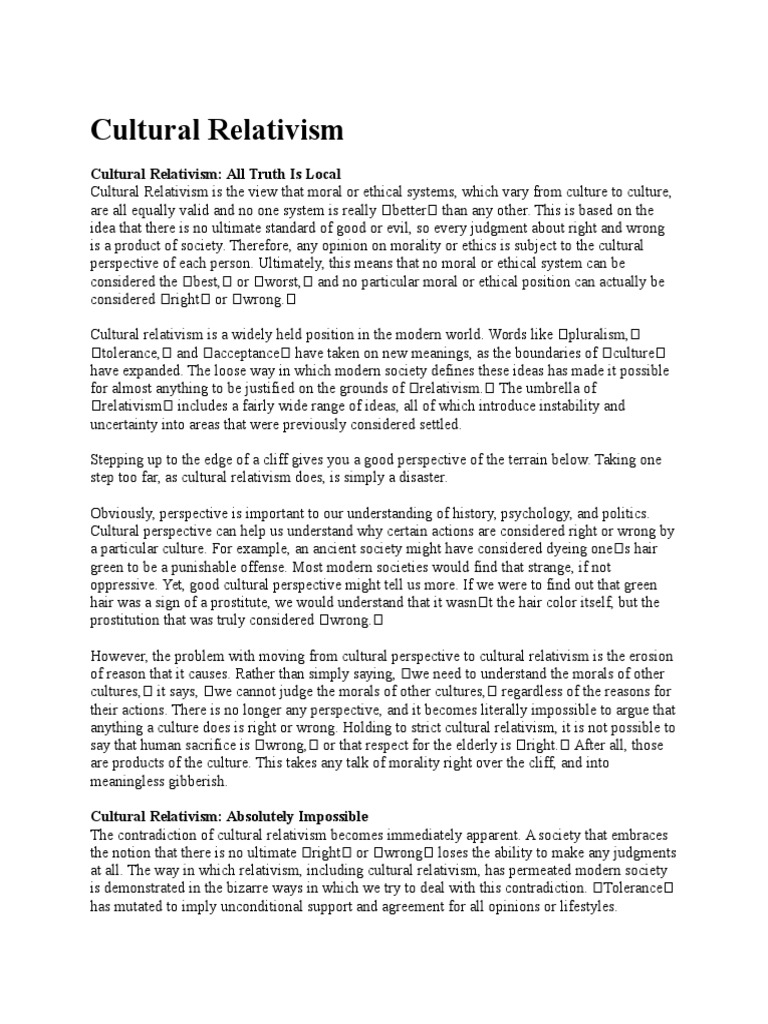Descriptive cultural relativism is a pivotal concept reflecting the notion that one’s beliefs, values, and practices should be understood within their own cultural contexts. This perspective counters ethnocentric views that posit one culture as superior to another. Instead of passing judgment based on one’s cultural standards, descriptive cultural relativism advocates for a holistic appreciation of cultural diversity. This approach has implications across various domains, including anthropology, sociology, and ethics, offering a nuanced understanding of cultural interactions.
At its core, descriptive cultural relativism operates on the premise that cultures exhibit distinct belief systems, traditions, and moral frameworks that are intrinsic to their social fabrics. For example, a practice deemed taboo in one culture may hold significant value in another. By employing an analytical lens, scholars can appreciate these differences, fostering an environment of mutual respect and understanding. This paradigm underscores that norms are not universally applicable; rather, they are shaped by historical, environmental, and social influences.
One essential element of descriptive cultural relativism is its distinction from normative cultural relativism. While descriptive cultural relativism seeks to merely observe and describe cultural practices without imposing judgment, normative cultural relativism prescribes a philosophical stance that suggests all cultural practices are equally valid. Such normative implications can sometimes lead to moral dilemmas, especially when confronting practices that might infringe on human rights. Therefore, a careful, descriptive approach enables a clearer understanding of cultural phenomena without succumbing to moral relativism.
The scope of descriptive cultural relativism extends into various areas, including but not limited to ethics, law, and social customs. In terms of ethical considerations, it prompts us to explore moral relativism—a notion that emphasizes how ethical systems are constructed variably across cultures. For instance, consider the differing stances on issues such as polygamy or dietary restrictions. In some societies, polygamous relationships are woven into the very fabric of social structures, while in others, they might be entirely forbidden. Herein lies the utility of descriptive cultural relativism: it enables a deep dive into these practices, elucidating their cultural significances rather than casting them as mere curiosities or aberrations.
Descriptive cultural relativism also finds applicability in legal contexts. Laws are often deeply rooted in societal norms and values, which can vary significantly from one locale to another. A legal system must reflect the cultural intricacies of its people; otherwise, it risks alienating those it serves. For instance, indigenous legal traditions may coexist alongside formal state laws, necessitating an understanding that courts must be adaptable and cognizant of cultural contexts. Such recognition allows for the construction of a more equitable legal framework that genuinely represents its constituents.
Social customs provide yet another realm where descriptive cultural relativism plays an instrumental role. Rituals, celebrations, and daily practices manifest a community’s worldview. For instance, consider mourning practices across various cultures. In some communities, expressing grief openly may be customary, while in others, a more reserved handling of sorrow prevails. By appreciating these differences, we gain insights into how emotional expressions are cultivated and maintained within cultural settings, fostering empathy and connection across diverse backgrounds.
Furthermore, educational systems have begun to incorporate descriptive cultural relativism into curricula, enhancing cultural competence among students. By exposing learners to a variety of worldviews, schools support critical thinking and cultural awareness. This educational approach not only prepares students for a globalized world but nurtures an appreciation for diversity, equipping them with the tools to engage with unfamiliar cultures constructively. In a climate where societal polarization is prevalent, such education is imperative for cultivating coexistence and reducing biases.
While embracing descriptive cultural relativism is laudable, it is not without its challenges. Critics argue that an overly descriptive approach risks absolving accountability, particularly in instances where harmful practices persist. This contention highlights a delicate balance that must be maintained. Descriptive cultural relativism should serve as a foundation for understanding, but it should not preclude the promotion of basic human rights. This calls for a thoughtful dialogue that traverses cultural boundaries while advocating for fundamental values.
In summary, descriptive cultural relativism presents an invaluable framework for understanding the complexities of human behavior across cultures. By highlighting the significance of cultural contexts in shaping beliefs and practices, it paves the way for dialogue, education, and greater tolerance. This perspective not only enriches the fields of anthropology and sociology but also enhances our collective capacity to navigate an increasingly interconnected world. Ultimately, embracing this approach equips individuals and societies with the understanding necessary to engage meaningfully with one another, fostering respect and celebration of our shared human tapestry.
